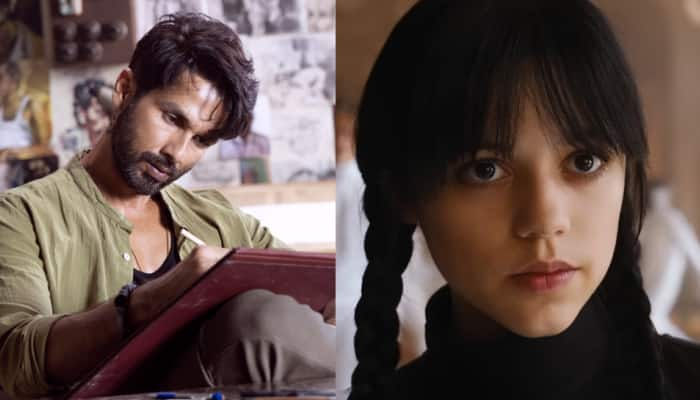Pandit Ravi Shankar, as I remember him
Despite his genius, the sitar maestro carried his greatness lightly.
Trending Photos
)
It was a sun washed winter afternoon and I was there to meet Pandit Ravi Shankar at a hotel in Connaught Place. My brief was to produce a chat show cum documentary on the sitar maestro.
He walked in gently, almost like a light breeze. There was a slight murmur in lobby, as few faces turned to notice him; and then almost instantly we were on our way to a peaceful area to discuss the modalities of the programme.
His beautiful wife Sukanya and daughter Anoushka accompanied him. There was a quiet understated elegance about the whole family. You could read they were wealthy and classical, in more ways than one. The ladies, being used to constant media presence, were most unruffled; polite but almost reticent.
What affected me most was the tender mellowness of Pandit ji. He was extremely courteous and soft spoken.
In the course of the shoot, he told us of his young bohemian days with an uncluttered openness that seemed almost unreal. Truthfulness is a rare commodity these days, after all.
Pandit Ravi Shankar was an avant-garde; he was the man who first exposed the West to Indian culture. He reminiscenced about how in the 1950s, when he visited Western Europe and the United States independently as a sitar player, India was perceived as a land of Maharajas and poverty, of snake charmers and sadhus.
“There was a deep seated belief that in India everybody took drugs. And that drugs were imperative for meditation, chanting OM, music and even making love,” he had recalled.
“I rebutted that thought with full energy and vigour.”
“Most musicians from India in those days could not communicate to the audiences abroad, they could only perform. Or they would talk about how their gharana was the best,” he had elaborated with a tinge of censure.
Pandit ji felt that the timing of his arrival in the West also mattered. There was a complex web of developments that was underway. The hippie culture had set in, there was the rebel movement and youth were crying for freedom.
It was the jazz buffs who were the first to lend an ear to the sitar genius from India. They related to his music and wanted to experiment with his tunes. And then, George Harrison became his disciple. From a small crowd, numbers swelled and Indian music became à la mode around town.
People in India tried to deride the young sitar player. They felt that he had compromised on playing music in India while gathering hordes of followers on western shores.
“I used to ask them, what is wrong. I am both here and there...... Today, the trend had reversed. I ask people where are you, and they say everything from Honolulu to what not. They are playing everywhere, they are getting a ready- made audience and making a lot of money,” he had laughed.
Pandit Ravi Shankar also spoke candidly about shortcomings of most musicians.
“The problem is ego.” He felt musicians only wanted appreciation and ovation, and did not necessarily take a pragmatic and balanced view of their talent or performances.
The other trend that he deplored was the competition of one-upmanship between musicians. Each artiste wanted the mike volume to be raised for his instrument during live shows and recordings. As a result, the finesse of music was getting lost and resulting in only high decibel noise.
Pandit ji further recalled his own struggle of coming back to India to learn from his Guru Allauddin Khan in late 1930s after first performing as a dancer abroad.
“I was used to the amenities of the West, of the 5 star culture, and the open and free environment. To come back was very difficult... to the heat and dust and backwardness. But I was determined to learn the sitar and I am so glad that I did,” he had said.
Allauddin Khan was a genius of rare gift. But he also had an extreme temper.
“He would turn into a demon when was angry. It was horrible....I was probably the only student of his who did not get a beating from him.”
Once when a student of Allauddin Khan could not play properly, he not only thrashed his student, but also hit him with the Tambura that his head went into it!
“The poor fellow was in hospital for six months,” according to Pandit ji, who added that something of this nature was improbable in today’s day and age when one would be put behind bars for such behaviour.
“I used to tell my Guru that you are Shakt – a tantric when you get angry, because your eyes turn red, and hair stand up.... it is a sight.”
But this was the only flaw that he encountered in his teacher. Pandit Ravi Shankar remembered how at other times, Khan could be the softest of persons with the gentlest of demeanours. “When he would play music and cry, we would all start crying,” the maestro mistily remembered.
Khan was also completely averse to drugs and alcohol and a man of great integrity and high moral character. Allauddin would not accept a rupee, not even a paan from his students in return for teaching them.
“Unfortunately, none of his students could imbibe all his qualities,” Pandit ji admitted.
Besides learning and living with his Guru, Panditji named his brother Uday Shankar as an abiding influence in his life.
“At one time people used to speak of Gandhi, Tagore and Uday Shankar in the same breath. Unfortunately, no one remembers him today,” Pandit ji had said.
He knew too well the fickleness of public memory and adulation. That was probably why he carried his own greatness so lightly despite being a Bharat Ratna and the man who composition of ‘Sare Jahan Se Achcha’ has been eternalised.
But having met Pandit Ravi Shankar, sat by him and heard him speak of his life and music, I feel one of his greatest attributes was the certain timelessness about him. At least for the people of my generation, he always looked the same, with a creased but glowing complexion, and watery eyes full of calm and soulfulness.
Like him, his music and legacy, I am sure, will remain ageless and celebrated for years to come.
Stay informed on all the latest news, real-time breaking news updates, and follow all the important headlines in india news and world News on Zee News.
Advertisement
Live Tv
Advertisement







)
)
)
)
)
)
)
)
)
)

